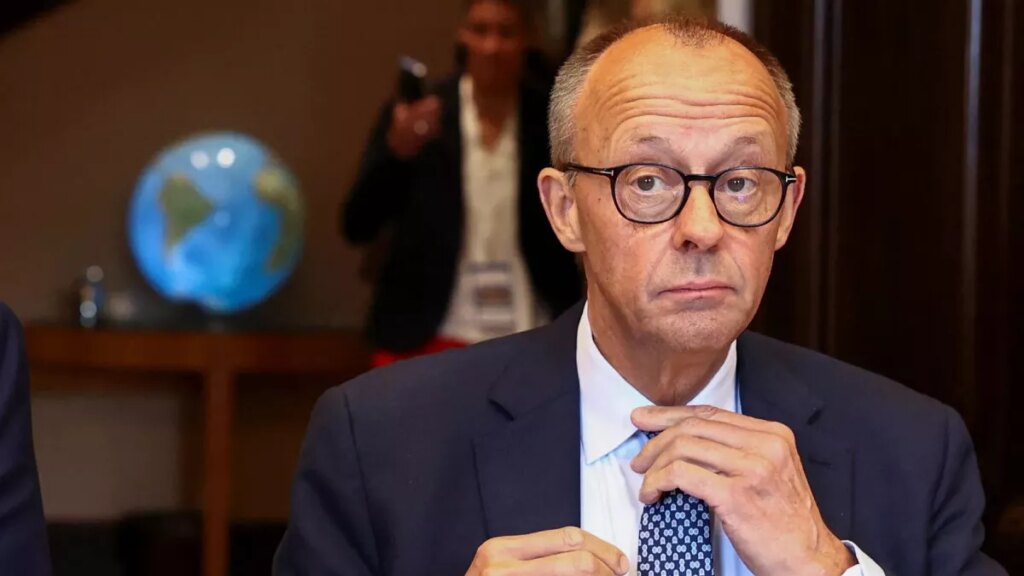Germany’s government has adjusted its economic forecast, projecting a mere 0.2% growth for 2025, followed by slightly better outlooks of 1.3% for 2026 and 1.4% for 2027. This stagnation signifies challenges not only for the nation but also for the broader European economy, as Germany plays a pivotal role in shaping European demand and supply chain resilience. Chancellor Friedrich Merz’s administration has unveiled plans to invest €500 billion into infrastructure projects and enhance digitalization in a bid to stimulate growth and revitalize the economy.
| Article Subheadings |
|---|
| 1) Implications of Germany’s Economic Forecast |
| 2) The Call for Urgent Reforms |
| 3) Investment Initiatives and Expectations |
| 4) Challenges from Global Competition |
| 5) Long-term Vision for Germany’s Economy |
Implications of Germany’s Economic Forecast
Germany’s latest economic forecast, signaling a meager 0.2% growth for 2025, underscores the gravity of the situation. The new Chancellor, Friedrich Merz, is facing a crucial moment, as this projection implies that Europe’s largest economy may experience only minimal expansion in the near future. This tepid growth trajectory has ramifications beyond Germany, affecting overall European economic dynamics, supply chain stability, and the continent’s competitive stance against global powers like the US and China.
An economy which has contracted over the past two years is now at a pivotal crossroads. The expectation for next year’s growth to reach 1.3%, followed by 1.4% in 2027, offers a glimmer of hope. However, both officials and analysts tend to view these projections as an optimistic outlook amidst a backdrop of historical growth hindrances and contentious market environments.
The Call for Urgent Reforms
In response to the disheartening forecasts, Katherina Reiche, the Economy Minister, has emphasized the urgent need for reforms to bolster competitiveness and innovation. During a recent statement, she remarked, “we need to act, now.” The core of her message is the necessity for swift action; for Germany to thrive in future global markets, significant investments must be made promptly.
She elucidated that critical growth would stem from increased government spending, yet acknowledged that it is contingent upon expediting planning and approval processes. Germany’s historical inefficiencies in these areas have stifled potential growth initiatives. To address this, her proposals include dismantling bureaucratic barriers, reducing energy costs, fostering private investment, and addressing the country’s comparatively high tax burdens.
Investment Initiatives and Expectations
To kickstart its economic revival, Merz’s government has launched an ambitious program aimed at encouraging investment across multiple sectors. The administration aims to allocate approximately €500 billion to rebuild and modernize Germany’s aging infrastructure over the next 12 years.
In a significant show of confidence, a consortium of businesses pledged in July to invest a total of €631 billion in Germany over the next three years. This considerable financial commitment, which includes various previously planned investments, symbolizes a collective belief in the potential for economic growth. These investments are intended to fortify the nation’s industrial foundation, subsequently brimming with opportunities for job creation and technological advancement.
Challenges from Global Competition
Despite Germany’s historical dominance in global trade—particularly in engineered products such as industrial machinery and luxury cars—the rise of international competition poses significant challenges. Chinese companies, in particular, have begun to threaten Germany’s established dominance in key markets. Additionally, external factors, like tariffs and trade threats introduced during previous US administrations, have further complicated Germany’s position.
This increase in competition reflects a changing global landscape, where established economic powers must now contend with aggressive market entrants. Germany’s policymakers need to consider innovative strategies to enhance competitiveness, particularly in areas like technology and manufacturing, to regain its supremacy in various markets.
Long-term Vision for Germany’s Economy
As Germany grapples with these challenges, the government remains focused on creating a sustainable long-term vision for the economy. The administration is seeking to balance immediate reforms with strategic planning for future resilience. The call for a substantial revamping of the economic framework seems more pressing than ever; without such measures, stagnation could lead to further decline.
By ushering in digital transformation and improving investment climates, German officials seem intent on positioning the country competitively for future global economic challenges. The vision includes a focus on innovation and modernization as cornerstones of Germany’s renewed economic strategy, cutting red tape to facilitate faster investment flows, and ultimately ensuring a robust economic landscape for future generations.
| No. | Key Points |
|---|---|
| 1 | Germany’s economic growth is projected at just 0.2% for 2025. |
| 2 | Urgent reforms and innovations are required to enhance competitiveness. |
| 3 | A €500 billion investment plan has been proposed to modernize infrastructure. |
| 4 | Germany faces rising competition, particularly from China. |
| 5 | Long-term strategies focus on digital transformation and removing bureaucratic hurdles. |
Summary
The current economic forecast for Germany highlights a period of alarming stagnation that poses challenges not just for the nation but across Europe. As Chancellor Merz pursues strategies aimed at revitalizing growth, the emphasis on urgent reforms, innovative investments, and improved competitiveness will shape Germany’s economic future. The stakes are high, and the outcomes of these initiatives will be closely monitored in order to gauge their impact on the continent’s overall economic landscape.
Frequently Asked Questions
Question: What is the projected growth for Germany in 2025?
The economic growth for Germany in 2025 is projected to be just 0.2%.
Question: How is the German government planning to stimulate the economy?
The government plans to stimulate the economy through a €500 billion investment in infrastructure and by creating a more favorable investment environment through reforms.
Question: What are the major challenges facing the German economy?
Germany is facing significant challenges from increasing competition, particularly from Chinese firms, as well as potential trade threats from other countries.
